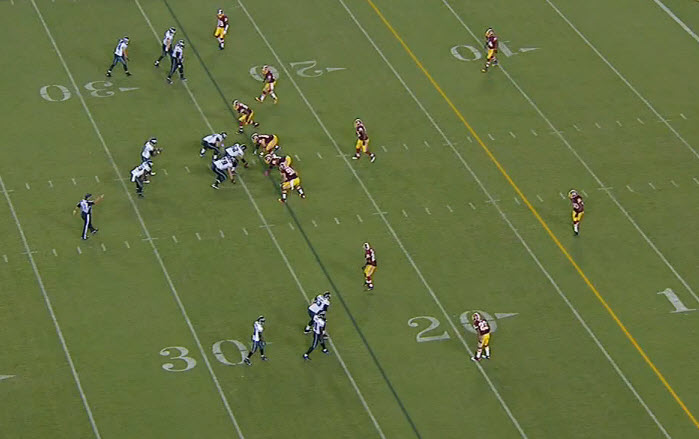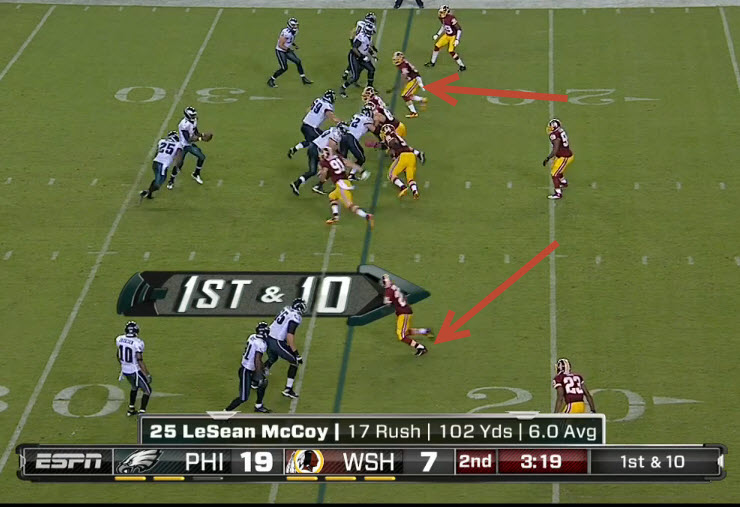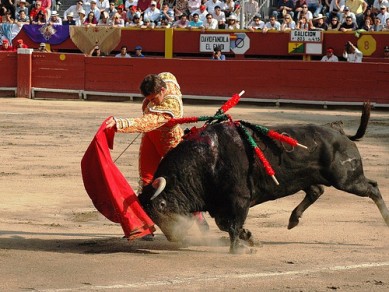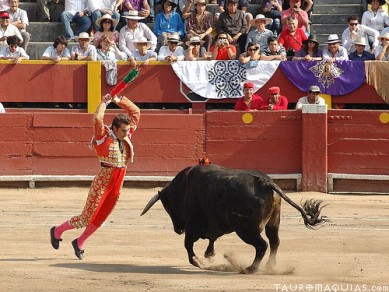Rafael Morán
Chip Kelly’s play calling in his NFL debut was effective but not dramatic, with one striking exception. Late in the second quarter, Kelly called one of the crazier formations you’re ever going to see, perhaps for the first time ever in the pros. There were only three linemen up front, with a group of three players set wide on each side — two receivers and a tackle.

Chip Kelly’s “Emory and Henry” play
Looks like a hyperdrive Doublestack play, right? Here’s the crazy thing, the Eagles ran the ball up the middle, with only three blockers against four linemen. (Vick “read” the fourth.) And LeSean “Shady” McCoy picked up ten yards.
Who has ever seen such a thing before? Um, Oregon fans. Kelly ran this play against Stanford last year. In fact, Charles Fischer wrote an entire article on it here at FishDuck.
That also means that Washington had seen it before. Defensive coordinator Jim Haslett said publicly before the game that “We’ve looked at endless film on Oregon.” Since Oregon ran this play in the red zone during their big showdown with Stanford, it’s a safe bet that Haslett looked at it very closely indeed.
In fact, Chip Kelly did not invent this play. (As he often says, nothing new has been invented since the forward pass. It’s all repackaging.) According to Villanova Receivers Coach Brian Flinn, Steve Spurrier ran it in an early 1990s SEC championship game, where it was very effective, and the University of New Hampshire used it on PATs during Kelly’s years there. Spurrier called it the “Emory and Henry play,” and Air Raid offenses deploy it under the name “Ninja.” It was invented by Coach Conley Trigg Snidow when he was at Emory and Henry College, leading them to the 1950 and 1951 Tangerine Bowls.
This is not a gadget play. It’s fundamentally sound spread football. It made sense for Philadelphia to run in this case, given Washington’s reaction, because the players set wide drew the Redskins’ secondary out, leaving the Eagles with Shady McCoy one-on-one against a linebacker. And any coach in the NFL would take that offensive scenario, with pleasure.
This is not a run play per se, though. It’s a packaged play that could be a run or pass depending on the defense’s reaction. Last December, Stanford got only one defensive back out wide to the right sideline, against three Ducks, so Mariota threw the screen there (to De’Anthony Thomas).
I have no doubt that Jim Haslett spent valuable practice time preparing for this play. He saw Stanford’s mistake in not having enough backs wide, so you can see why his linebackers ran wide and up to line, to cover the screen. This just left the middle open, so the Eagles ran the ball up the gut and got ten yards anyway.

Jim Haslett had a plan for it
There’s a bigger strategy at play here, too. Notice when the Eagles ran this play — with 3:20 remaining in the first half, and their offensive tempo at its height. Washington was reeling, down 19-7 and visibly exhausted from Philadelphia’s relentless attack. THAT is the perfect moment to call a dramatic play. Now, show them something unexpected and give the defense every opportunity to overreact or make a mistake. Washington didn’t overreact, to their credit, so Philadelphia quietly took the ten yards the defense gave them and got inside the red zone down to the 14.
In fact, the real value of this play may be strategic. You can bet that, after the Eagles’ stunning debut, every team facing the Eagles is worried about stopping Kelly’s offense. Imagine you’re an average linebacker on, say, Kansas City. You’re already a little spooked by Philadelphia’s attack heading your way. Now, during practice, your coach starts introducing some crazy offensive alignment
where you suddenly must run way out to the sideline. Oh, and you’ll only have 18 seconds to recognize the play formation and get out in position, or risk giving up a touchdown to the practice squad player doing his best impression of DeSean Jackson.
During the actual game, whenever the Eagles shuffle around, you’re wondering “Is this it? Is this that play?” Your attention is split which only compounds the challenge, since you’ve spent less time practicing against Philadelphia’s bread-and-butter Inside Zone Read/Outside Zone Read plays, or training for their tempo.
And after all that, Kelly probably doesn’t call the play at all. He has already gotten into your head and chewed up valuable practice time. This time, he’ll call a different odd alignment, maybe the Swinging Gate, and get you spinning in the opposite direction.
You know what this play is? A bullfighter’s red cape. You’ve just been tricked into staring at it and charging after its ruffles.
And Chip is getting ready to plunge that estocada between your shoulders.
Mark Saltveit’s best-selling book “The Tao of Chip Kelly” has received rave reviews from coaches, players and sportswriters since its release in June. You can find it at the Oregon Ducks Stores in Portland, Eugene and Bend, at Powells Books, at the Multnomah Athletic Club M-Porium in Portland, various bookstores in Pennsylvania and New Hampshire, and online at http://www.chipkelly.tv/
——————————————————————————————————————————–
Announcements
*Check out our new pregame opponent analysis on Saturday mornings. Our analysis will be unlike any other, so learn what to watch for before the game on Saturday!
*Want some College Football humor? Check out FishDuck.com‘s GIF Collection! (Click here) Pass it along!
*If you would like to join the other 80+ volunteers at FishDuck.com, and have five hours a week to donate . . . we have slots open for volunteer Editors, Writers, Analysts, Photo Archivists and Social Media Associates. Can you help us manage people? Consider our volunteer Sales Manager and HR Manager positions and give some time each week to help young associates learn! E-mail us at charles@fishduck.com.
Related Articles:
Chip Kelly Update: Everything's Good Again ...
Chip Kelly Update: Wailing and Gnashing of Teeth
Shock and Awe -- The Oregon Ducks' Football Hangover Effect
Despite Lopsided Score, Georgia State "Never Stopped Believing"
Hope Springs Eternal for Ducks
Incompetent Pac-12 Officials: How Do You Miss ALL of THIS?
Mark Saltveit’s newest book is “Controlled Chaos: Chip Kelly’s Football Revolution” (Diversion Books, NY) has been recently released. He is the author of “The Tao of Chip Kelly” (2013) and writes on science, religion, wordplay and political scandals. He is also a standup comedian and the world palindrome champion.



